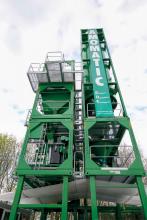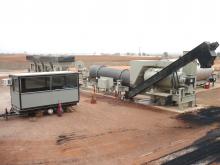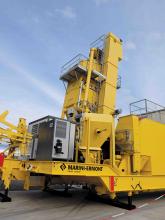
A number of key innovations are coming to the asphalt plant market, with new models as well as new technologies being introduced.
One of the most notable developments is Ammann's new continuous plant, which has been developed using proven technology already seen in the firm’s batching plants. To meet demand for a versatile plant, the new ACP 300 ContiHRT can use a high percentage of RAP in the feed, while various options are available to extend its range of capabilities.
This plant is said to be capable of producing high-quality mix with more than 60% recycled asphalt (RAP). The plant benefits from Ammann’s proven recycling technology, which is said to maximise RAP utilisation. At the same time, the plant also meets the world’s most stringent emissions guidelines in regard to dust as well as gases.
The plant features a design said to ensure gentle preheating of the RAP in the feed. The firm says that the benefit of this design is that it removes the moisture from the feed material. As a result, there is no thermal stress in the RAP when it comes together with the superheated aggregate, unlike earlier generation equipment. The heating system used by Ammann is also said to ensure that the bitumen contained in the RAP is not damaged or burned. Another advantage of the Ammann plant design means that rejuvenators are rarely needed to restore the quality of the materials used, providing a substantial cost saving for customers.
According to Ammann, its plant design ensures that there is a homogenous mix while the process minimises fuel burn and reduces the levels of CO2 emissions.
The plant incorporates a RAP dryer for the addition of recycled materials and a separate cold recycling feed. The RAP is preheated to 130°C and Ammann says that its design concept means that the RAP can be used as the main feed material.
The plant is said to be versatile as it is capable of incorporating shingles, liquid additives, fibre granulate and foam AC. It can access a recycling system for RAP utilisation up to 60%; a separate cold recycling system for 30%; or a combination of the two. The ACP 300 ContiHRT can also produce high amounts of mix without any RAP, while warm mix can be produced with or without RAP. The plant’s production capacity is 300tonnes/hour using a twinshaft mixer, although 400tonne/hour and 500tonne/hour mixers are also available if required.
According to the firm, a critical factor in ensuring a high value product is to ensure that the quality control of the RAP in the feed is carried out correctly. Ammann says that the use of RAP in road construction has suffered from a bad reputation in the past in some countries due to shortcomings with how the quality of the material has been assessed. In addition, further problems have arisen when the RAP has been overheated when used, damaging the bitumen content.
Testing the grade and quality of the RAP stockpiles is important so as to be able to accurately define the mix parameters. The size of the material, the quality of the aggregate in the RAP and the degree of oxidation have to be considered for each mix.
Ammann’s new continuous plant features the same principle as the company’s batch plants for the use of RAP in the feed. This has a traditional counterflow drum for the virgin material alongside a special RAP drum, with separate feeds for each.
The user can operate the plant in different configurations, depending on the feed type and mix required. The plant is equipped with a cold RAP feed to give the customer flexibility and this allows RAP use of up to 30%. Using the RAP drum allows up to 60% RAP in the mix. Meanwhile, combining the two streams with 60% RAP in the RAP drum and up to 15% RAP in cold mix allows up to 75% RAP for warm mix. The plant is versatile and able to work with liquid or granulated fibres as additives, as well as imported mineral fill to meet recipe standards.
The plant is operated using Ammann’s proprietary as1 Control System, which is said to enable high production while optimising the use of fuel and aggregates and allowing the user to calibrate feeds and cold chutes around the plant. Other features of the plant include a service platform and stairway design that improves service access to major components such as burners, drums, filters and the twin-shaft mixer. Ammann says that installation and relocation for the plant is speedy and simple as its horizontal design ensures fast and easy assembly and disassembly. Optional quick cabling and steel skids further reduce relocation times.
A wide range of optional equipment is available, including burners for fuel oil, natural gas and LPG. The firm can also provide a combination burner, which means the user can switch between different modes. The plant can be equipped with a shingle system so that the user can add shingles directly into the mixer. Silos available include a 300tonne capacity design with two compartments, a 600tonne capacity array with four compartments and a 1,200tonne capacity layout with 10 compartments. Other options include AC tanks with better insulation, a filling pump and tank-to-tank pumping and circulation. In addition, cold feed system options include additional feeders, vibrators and gravimetric dosing.
North America target
Marini is now aiming to enter the North American market for asphalt plants, but using its proven technology rather than developing new plants. Filippo Baldassari is head of global sales for Fayat Mixing Plants and commented, “Now we’ve put a challenge to ourselves to enter the US market.”
He said the firm will focus on the Marini-Ermont continuous technology and added, “We’ve selected models that we think will be suitable for the US and Canada.”
The company has several continuous plants it thinks will be of interest to North American customers and these include its small mobile 120tonne/hour plant, its containerised Explorer model rated at 160tonnes/hour and the 160tonne/hour Retroflex model.
The company has hired a local salesperson to handle the range as it believes that there are customers looking for an alternative to existing suppliers. Baldassari said, “We have sold a small mobile 120tonne/hour plant to Canada and we want to expand from this little by little.”
The firm will also supply high efficiency burners to re-equip existing plants. Baldassari said, ”We can sell burners manufactured in France to the US and Canada.” He said there are only a few competitors for quality burners in North America, “It’s our chance to put a foot in the door on retrofits.”
Meanwhile, as recycling asphalt is important in the US, Baldassari thinks Marini can capitalise on this demand as the firm has a wide selection of technologies available. The TSM models can use up to 30% RAP, the Retroflux up to 50%, the TSX up to 70% and the TRX 100%. He said, “It offers an alternative that’s not in the market now.”
In addition, the company has developed an innovative virtual reality package for use with its asphalt plants. This allows personnel to take a walk around an asphalt plant without actually having to be beside it in the metal. The firm is intending to use this as a training tool for maintenance personnel and operators as it allows.












